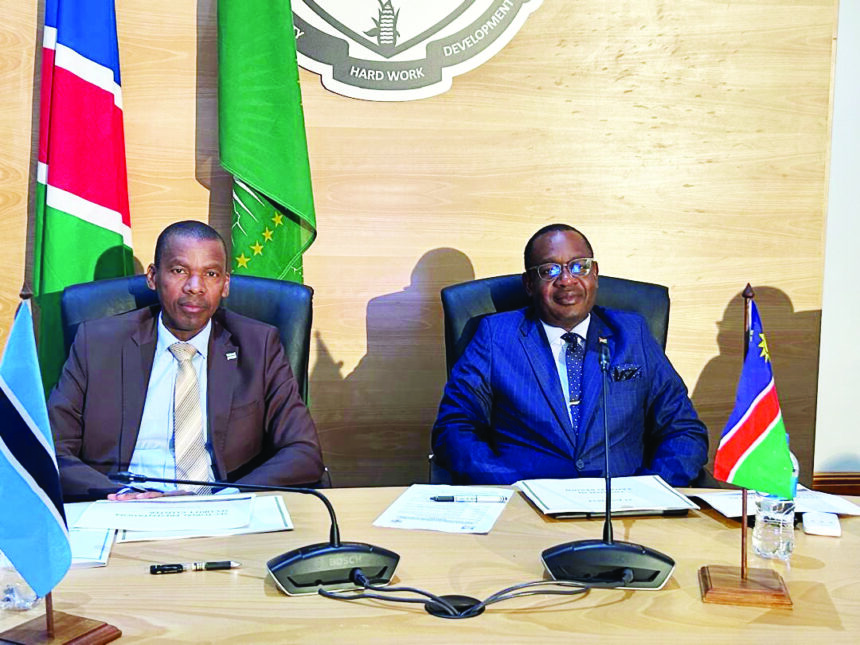Albertina Nakale
Aron Mushaukwa
KATIMA MULILO – International relations minister Peya Mushelenga said it is pleasing to note that the general security situation along the Namibian-Botswana common borderline has significantly improved, and peaceful co-existence as well as good neighbourliness has continued to prevail.
Mushelenga made these remarks at Katima Mulilo yesterday during a follow-up visit with his Botswana foreign affairs counterpart, Lemogang Kwape, which saw a signing ceremony of a twinning agreement between the Zambezi Regional Council and the Chobe District in Kasane.
Over the years, there have been reports of cross-border challenges by communities living alongside the Namibia-Botswana borderline, where both nations called on their citizens to foster peaceful co-existence and fruitful cooperation.
The agreement aims at reinforcing cross-border cooperation as stipulated in Article 8 of the Border Treaty between the two nations in the areas of security, exploration, and exploitation of shared natural resources.
“This is, however, not to say there is a complete absence of incidents, which do occur sporadically. A situation where our people live in fear creates an untenable environment, hindering the establishment of a climate conducive to peaceful co-existence and good neighbourliness. Against this backdrop, this occasion provides us with a crucial platform to jointly address our respective communities and stakeholders to emphasise the importance of peaceful co-existence and good neighbourliness,” Mushelenga noted.
While cordial relations persist at the highest level, Mushelenga maintains that there is an urgent need to consolidate these ties at the grassroots level, particularly in addressing cross-border concerns faced by communities along the shared riverine border.
“The recurrence of avoidable tension poses a risk to the progress achieved thus far, emphasising the need to ensure the safety of ordinary citizens engaging with shared natural resources along the common riverine boundary. This responsibility falls on our shoulders as leaders to find lasting solutions and elevate the matter to a point where advanced harmony becomes the natural order,” Mushelenga emphasised.
He is convinced that the people of Botswana and Namibia are undeniably a shared community, bound by their common culture and heritage. Throughout their existence, he said, they have relied on shared resources, fostering a relationship of mutual interdependence. The amicable bilateral relations between Namibia and Botswana are a natural outcome of this historical connection.
Further, the minister pointed out the recently-concluded Joint Civil-Military Community Sensitisation Campaign for communities along borders, which took place from 8 to 16 July 2024, as an example of common goals for both nations towards problem-solving. The newly-established Civil-Military Cooperation (CIMIC) Plan aims at educating communities on critical issues such as illegal fishing, border crossings, poaching, and the smuggling of firearms, drugs, and illicit goods. The campaign commenced in both the Zambezi region and the Chobe District in Botswana and was established with optimism that it will continue to yield positive outcomes, and contribute to the overall collaboration and prosperity of both regions.
Moreover, he said Namibia aspires to build peaceful and harmonious relations with her neighbours by further strengthening the existing strong bonds of friendship and solidarity, fostering closer people-to-people exchanges, and enhancing trade, investment, and infrastructural development. This is done within the spirit of regional integration, the African Continental Free Trade Area (AfCFTA), and the attainment of the AU Agenda 2063, ‘the Africa We Want’.
Meanwhile, Kwape said there have been tremendous improvements in the region. He said the implementation of the usage of national identification cards to cross borders has improved.
“The communities living alongside the border have frequently visited families and engaged in economic activities on both sides. Since the introduction of the use of national IDs to cross the border by our citizens, the use of border passes has gone down considerably so much that we need to abolish the use of border passes at our mission next month. The use of IDs, the operation of the one-stop border post, and the 24-hour border crossing have stamped out Namibia and Botswana as trailblazers in the African continent,” Botswana’s foreign minister alluded.
Kwape reassured the great importance Botswana attaches to the relations of the two sisterly countries. “Botswana is as committed as ‘a pig is to breakfast’. These relations are echoed in the close historical, cultural, and communal ties of our people and the Chobe district and Zambezi region are no exception. We are one person. We will remain one people. Our two communities share national resources which they depend on for their daily livelihoods. As a result, it is their responsibility to protect and conserve the natural resources for prosperity,” he stressed.
The scheduled agreement to be signed in Kasane will focus on local economic development, environment, waste management, shared riverine resources, culture and sports, not only enhancing cooperation between the two regional councils, but also encouraging people-to-people linkages and cooperation among traditional authorities.
Over the years, residents of the Zambezi region that are located alongside the Chobe and Kwando rivers lived in fear because of the alleged killings, harassment and cross-border human rights violations by the Botswana Defence Force.
However, Zambezi governor Lawrence Sampofu said residents now feel safe.
“Our communities along our borders now feel a bit secured, after the deployment of our troops but they are still living in fear of BDF harassment and threats. They will now be free to fish, get lilies, cut grass for housing and for making mats and making brooms, reeds for court-yards and decorations and gather all types of fruits along the rivers,” stated Sampofu.


